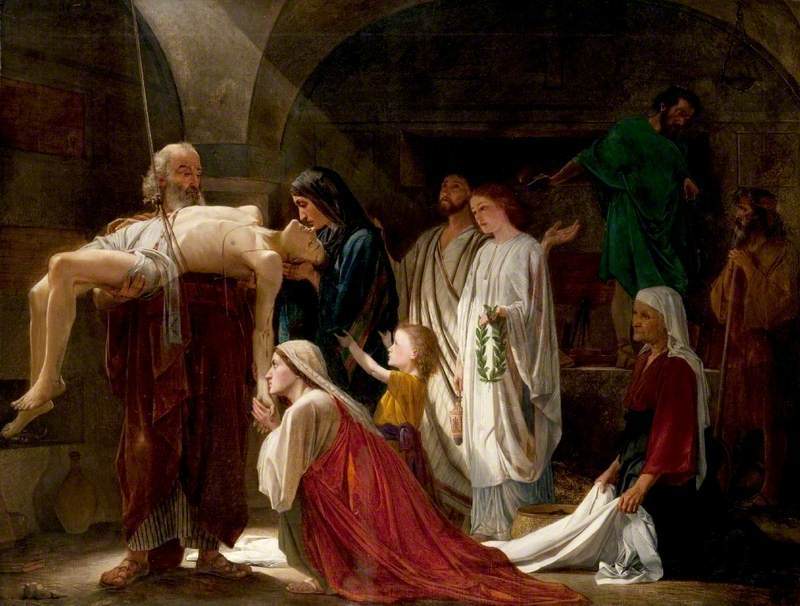Catholicism gives us the irreplaceable example of the martyr, not as a plaster figure but as the living image of Christ. And that helps us to make judgments with some basis in fact.
Martyrs represent more than just names or dates on a calendar. As Saint John Paul II explained – take note – in his encyclical On Faith & Reason, not in a merely devotional context:
The martyrs know that they have found the truth about life in the encounter with Jesus Christ, and nothing and no-one could ever take this certainty from them. Neither suffering nor violent death could ever lead them to abandon the truth that they have discovered in the encounter with Christ. This is why to this day the witness of the martyrs continues to arouse such interest, to draw agreement, to win such a hearing and to invite emulation. This is why their word inspires such confidence: from the moment they speak to us of what we perceive deep down as the truth we have sought for so long, the martyrs provide evidence of a love that has no need of lengthy arguments in order to convince. The martyrs stir in us a profound trust because they give voice to what we already feel and they declare what we would like to have the strength to express.
They are the standard for understanding people – all people – who arise in human history, not just on a gut level, but according to the truth that they express, the truth of Jesus Christ, to which we have committed ourselves by baptism.
Now, we all hunger to see genuine humanity played out in front of us. We see it in the lives of the martyrs. They live out something of the deepest truth of Jesus Christ. So, far from being abstractly pious or merely edifying examples, the martyrs really relate to real people in real time.

In contrast, celebrities (which increasingly seems to include politicians and government officials) usually treat other people as an exploitable resource. They want people’s attention, money, or votes. Most of the highly paid media people, too, peddle their own political and social views these days. In fact, there is a not a single authentic decision about people that can be left to celebrity-standards. Whether we are choosing a spouse or a friend or a cause, we need the martyr-standard.
Celebrities seek our attention in order to exploit us. Usually, they need scripts so that they have something to say – celebrity in itself being otherwise mostly-empty status. In a celebrity, we might see some part of ourselves, as we are, or, how we would like to be. We think they represent our values, but it’s almost entirely an illusion. After all, we have never met and all we know about them comes via the media, which has its own ways of exploiting celebrity.
Celebrities in the entertainment industry frequently give us nothing more than scandals and shocks, something to get people’s adrenaline going or perhaps their endorphins. Rarely does their work (let alone their lives) stimulate serious thinking or teach us something of value. Their natural habitat is a thicket of theatrics and hyperbole. The sky will fall unless we listen to them – on diversity, or climate change, or abortion “rights.”
Martyrs, by way of contrast, don’t seek our attention. They don’t use the truth for their own advantage. In fact, being consistently truthful usually came at the cost of their own great disadvantage. Living the truth is simply who they are, rather like Jesus Christ going through his daily life. Their every relationship is imbued with truth and love. In good times and in bad, they simply express this truth. It fills their words and actions. They don’t need scripts because they are one with the words they speak.
Martyrs are distinguished from celebrity-types in another way. They work for the common good – they don’t just talk about it (usually, with one another), as if that already classifies them as superior to the rest of us.
We have two fundamentally different types of human beings. One type incarnates Christ into every daily situation showing the real possibilities of human life. Therefore, they are perpetually memorable and attractive. The other type also teaches – how mean and self-centered human life can be, and what we should not seek to imitate.
John Paul II once said, speaking of Saint Maximillian Kolbe: “the secret of his heroic charity [were the words] ‘Only love creates’, he repeated [these words] to all those who approached him. This is the expression that, like a lamp, illumines his whole life. It was this superior ideal, this essential duty of every true Christian, that enabled him to overcome the cruelty and violence of his tremendous ordeal by the splendid testimony of his brotherly love and his forgiveness of his persecutors.” And in another place, he said of martyrs, “it is Christ who teaches through the lips of his messenger.”
If we want real celebrity, to be eternally worthy of remembrance, let’s forget the false celebrities – and try to imitate that “superior ideal.”














